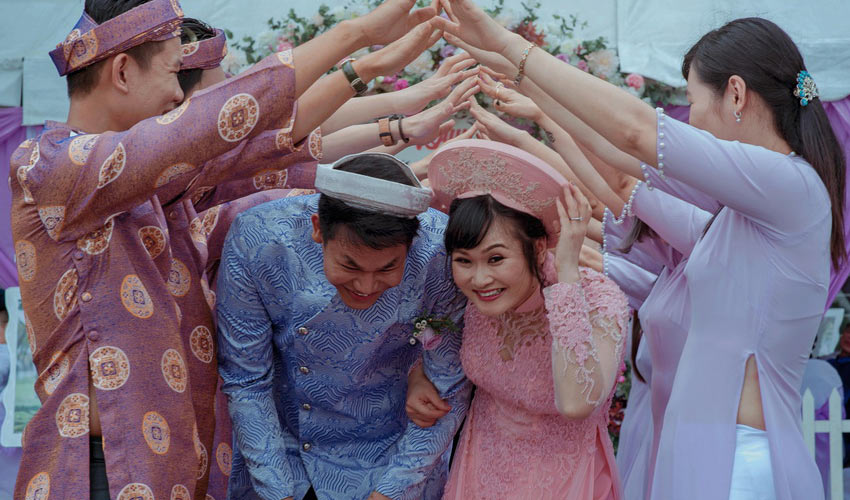The Health Benefits of Marriage For Men
I first tied the knot on March 3, 2003, and it’s astonishing to realise how many years have flown by since that special day! Recently, I discovered a fascinating article discussing the health benefits of marriage, and it truly captured my attention. Honestly, I had no idea that being married could have such a positive impact on one’s health. However, after having studied the details, everything clicked into place for me. Allow me to share the intriguing insights I gathered about the connection between marriage and well-being. For those who are single, keep reading! In this article I'll cover: "Being Healthy, Happy and Single" as well.
One compelling theory that illuminates the relationship between marriage and health revolves around the concept of self-selection. In essence, people who enjoy greater health and wealth tend to be more inclined to marry, and they often seek partners with similar attributes. Conversely, those facing challenges related to health or financial stability are less likely to enter into marriage. While this self-selection phenomenon is a significant part of the narrative, the benefits of marriage extend far beyond initial economic and physical well-being.

Marriage fosters a sense of belonging and companionship, providing people with invaluable opportunities to engage socially, combat loneliness and promote emotional well-being. This social integration, the extent of a person’s involvement in social relationships and community activities, plays a crucial role in influencing health outcomes. Research has demonstrated that strong social connections can be instrumental in reducing the risk of hypertension and heart disease, alongside diminishing the likelihood of extreme outcomes such as suicide and premature death.
Another vital aspect linking marriage to health is its impact on the body’s inflammatory processes. Studies have shown that loneliness and a dearth of close relationships can lead to increased inflammation, a natural response of the body to heal from illness, injury, or disease. While acute inflammation is necessary for recovery, persistent or chronic inflammation has been associated with a range of serious health issues, including heart disease, arthritis, several forms of cancer, and autoimmune disorders. Although single adults often cultivate rich and meaningful relationships, marriage inherently creates more frequent opportunities for intimacy and social interaction, thereby supporting the connection between marital status and inflammation levels.
Digging deeper into this intricate relationship, it becomes clear that gender dynamics also significantly influence the interplay between marriage and health. Research focused on the quality of marital relationships, gender, and inflammation reveals intriguing findings. For instance, one study found that women experience higher levels of inflammation linked to lower spousal support, a connection that was not observed in men. Similarly, when couples engage in negative communication patterns such as one partner making demands while the other withdraws, women would show heightened inflammation levels, while men seemed unaffected. These layers of understanding collectively underscore that the relationship between marriage and health is multifaceted. The positive implications of marital relationships manifest not only through increased socio-economic advantages but also through the essential emotional and social support systems that they provide, which are critical to maintaining good health across a lifetime.

Longevity & Marriage
Research reveals a striking reality: married persons, both men and women, tend to enjoy an average lifespan that stretches two years longer than their single peers. This substantial longevity advantage can largely be attributed to the positive influence spouses wield over each other's lifestyle choices. An abundance of studies corroborate the notion that married couples often adopt healthier diets and exhibit reduced rates of smoking and excessive alcohol consumption. Such health-conscious habits undoubtedly contribute to the longevity observed in married people. Yet, intriguing patterns emerge when we dissect these findings further. Men married to women appear to reap additional longevity benefits compared to women married to men, and several factors may illuminate this discrepancy. For instance, wives frequently take on a nurturing role, actively encouraging their husbands to embrace healthier behaviours and facilitating choices that promote well-being. Conversely, married men are generally less inclined to influence their wives' health habits. This disparity underscores a dynamic where women play a significant role in promoting health initiatives, ultimately benefiting their partners' longevity.
Interestingly, data suggests that in same-gender relationships, partners tend to collaborate more effectively to cultivate positive health behaviours. In these dynamics, mutual support and teamwork become key drivers of wellness, underscoring that the interplay between partner gender can shape health patterns. Moreover, the desire to encourage healthier lifestyles is evident across marital partnerships. Both men and women are more likely to aspire toward changing their partner’s health behaviours, particularly when they perceive that their spouse's habits fall short of their own standards. This urge reflects a powerful aspect of relationships: the interplay between individual health and the shared commitment to well-being.
The quality of a relationship also plays a vital role in shaping health behaviours. Evidence shows that people who report higher levels of support within their marriages are more likely to engage in physical activities, such as walking for exercise. This effect, however, takes on a more pronounced significance for men as they age. In contrast, older married women do not experience the same heightened correlation between marital support and physical activity, suggesting that the dynamics of support may evolve differently across genders over time. In summary, the interplay of marital relationships, along with the unique influences of partner gender and relationship quality, creates a complex landscape that significantly impacts health behaviours and longevity. As we unpack these dynamics, it becomes clear that the support and encouragement stemming from a committed partnership can greatly enhance not only the quality of life but also the duration, painting a hopeful picture for those who share their lives with a devoted spouse.

Cultural Influences on Caregiving Practises
To gain a deeper insight into how men's health is positively influenced by their wives, it’s essential to examine the deeply ingrained cultural norms that dictate caregiving roles within committed relationships. Historically, society has positioned women as the primary caregivers, leading to certain expectations that can shape family dynamics and individual well-being. This phenomenon is particularly pronounced among middle-aged persons, especially women who often find themselves going through the complexities of what is commonly referred to as the "sandwich generation." These women frequently juggle the responsibilities of raising children while also caring for ageing parents, which can create a significant emotional and physical burden. The relentless demands of caregiving can deeply impact their immune systems and overall health, highlighting an often-overlooked aspect of the caregiving experience. Moreover, the concept of invisible labour, tasks associated with child-rearing and household management that are typically shouldered by women, further complicates their health landscape. Such responsibilities can eat away at the time women might otherwise spend on their own self-care, including engaging in physical activities that promote their well-being. This imbalance can lead to a diminished quality of life for women, as they become increasingly consumed by the needs of others.
Additionally, research shows that women are more likely to take the lead in managing their spouses’ health needs. They often take charge of scheduling doctor's appointments, ensuring adherence to medical advice, and figuring out the complexities of health care systems for their husbands, while men are less inclined to reciprocate this level of involvement for their wives. Intriguingly, it is often only when faced with the reality of their wives’ illness that men significantly ramp up their caregiving efforts, illustrating a conditional response to the situation rather than a consistent shared responsibility. In this light, the interplay of gender roles and health highlights the critical importance of supportive partnerships in relationships. Investing in and nurturing these dynamics not only fosters women’s health but also leads to notable improvements in men's well-being. It’s a reminder that when one partner thrives, the benefits can extend to both, enriching the health and vitality of the entire family unit.
Naturally, Not All Marriages Are the Same
The dynamics of relationship quality and interpersonal conflict play a significant role in the landscape of marriage and its effects on health. Society has long perpetuated gendered norms that often position women as the primary caretakers of emotional well-being within relationships. Consequently, women tend to invest more of their time and energy into nurturing these connections and managing conflicts that arise, placing them at a disadvantage when it comes to emotional resilience. Meanwhile, men frequently bear a lighter load regarding the emotional and relational aspects, leading to a distinctive imbalance in their experiences. Research underscores a startling reality: women are more likely than men to derive their identities from their relationships. This deep-rooted connection means that when conflicts arise, be it marital discord or other relational strains, women often endure more pronounced negative impacts on their emotional and physical health. This phenomenon manifests in various detrimental ways, including heightened risks of metabolic syndrome, increased inflammation, and greater susceptibility to cardiovascular disease.
However, it’s crucial to clarify that these patterns do not imply that marriage is a universal remedy for health issues, nor do they suggest that those who remain unmarried are destined for poorer health outcomes. The truth is far more nuanced. Unmarried people can certainly lead healthy and fulfilling lives, enjoying many of the same health benefits that accompany marriage. (You can read more about being single and happy in the next paragraph.) The key lies in cultivating and nurturing robust social connections and actively engaging with one’s community. Establishing strong social ties provides significant emotional support, which is vital for mental and physical well-being. Additionally, prioritising a healthy lifestyle, making informed dietary choices, seeking regular preventive healthcare and implementing stress-reduction techniques can empower all people, regardless of their marital status, to live longer, healthier lives. Ultimately, the focus should be on fostering meaningful relationships and nurturing personal health, rather than solely on the institution of marriage itself.

Healthy, Happy & Single
What follows is a reflection stemming from an insightful dialogue I had with my Thai landlord, during which we looked closer to the intricacies and nuances of single life…
I’m 55 and I’ve been single my whole life. Embracing the single life is one of my greatest joys. It’s not a phase I'm merely enduring; it’s an empowering choice, my unequivocal Plan A. While many of my friends and family seamlessly transitioned into couples and donned wedding bands, I found myself resolutely uninterested in that path. In those earlier years, I often wondered if it made me somehow lag behind, as if I were waiting for the proverbial "marriage bug" to bite me. But as time went on, it became increasingly clear that my lack of interest in settling down wasn't a delay as it was a decision rooted in self-awareness and personal freedom. I’ve come to realise that being single doesn't signify a lack of fulfilment; rather, it allows me to cultivate a life of my own design. I revel in the freedom to explore my passions unapologetically and make choices that resonate with me alone. This lifestyle nurtures my sense of adventure, creativity, and authentic self-expression, free from the expectations that often accompany conventional partnerships. The beauty of living single lies in its boundless opportunities. Each day unfolds like a canvas for me to paint my experiences, explore new avenues, and discover facets of myself that might remain hidden in the shadows of conformity. I cherish the spontaneous adventures, the quiet evenings spent with a good book, and the freedom to carve life on my own terms. This is not a transient state of being; it is my choice, my celebration of independence, and a vibrant affirmation of self-love.
Single by Choice
It dawned on me one day that the idea of being "bitten" by the notion of a romantic relationship was nothing more than a fleeting concern, a shadow that faded into the background. I was, and always would be, a proud embodiment of the single life. Embracing this truth transformed my world entirely. With that clarity, I made a deliberate choice in my personal life: I would fully, joyfully, and unapologetically embrace my status as a single person. This decision infused my professional life with newfound passion and vigour. I dedicated myself to promoting the value and vibrancy of singlehood, devoting my energies to researching, writing, and advocating for the understanding that a single life can be rich and fulfilling.
While I often spoke enthusiastically about the joys of living single, I recognised that my reality was complex. Some perceived my single status as synonymous with an empty life, and this misconception manifested in mundane ways like being asked to cover shifts at work during inconvenient hours, simply because my colleagues assumed I had no commitments. Friends in couples frequently filled their weekends with dinner parties and movie outings, leaving me to navigate my social life through weekday lunches or children’s birthday celebrations. Encountering new people often led to awkward moments where, upon discovering I was single, they eagerly offered to set me up, as if my singlehood was a problem to be solved rather than a life choice to be celebrated. I never regarded myself as incomplete or lacking, which made me curious about the experiences of other singles navigating similar perceptions.
To explore these shared sentiments, I began initiating conversations with fellow singles. At one particular social event, I approached a woman I recognised as single and asked her whether she felt the weight of judgment or differing treatment because of her status. What followed was a revelatory exchange; she animatedly shared her experiences, and soon others joined us, eager to contribute their own stories. What started as a simple question quickly morphed into a deeper dialogue, illuminating the myriad ways society tends to overlook the richness of single lives. That very night, I found my inbox flooded with emails from attendees who reflected on their own experiences and insights. It became clear to me that I had struck a chord.
The stigma against single persons runs deep; too many people regard us as living a diminished existence. I came to understand the roots of this misconception, shaped by media portrayals and societal narratives that insist marriage is the ultimate goal, often glorifying it while relegating singlehood to the side-lines. Conventional wisdom suggests that marriage is the key to a happier and healthier life, asserting that it fosters deeper connections and enhanced well-being. Yet, within the realm of singlehood lies an incredible wealth of joy, freedom, and the opportunity for self-discovery that is often overlooked. My mission, henceforth, became not just to live my truth, but to inspire others to recognise the profound validity and richness of the single journey.

Being Single, the Bottom-Line
Single people represent a rich tapestry of experiences and perspectives. Among us, there are those who wholeheartedly revel in the joys of singlehood, as well as those who cherish their independence yet remain open to love, provided it aligns with their elevated standards. Then, there are also those who genuinely desire companionship, longing for that special connection meant to share life’s journey. Research reveals a fascinating trend: those who embrace being single without fear, seem to thrive more than those preoccupied with the idea of solitude. These self-assured people exhibit traits such as open-mindedness, emotional resilience, and an admirable ability to cope with the inevitable rejections that life may throw their way. They generally experience fewer feelings of loneliness and depression, showcasing that a fulfilling single life is not a contradiction but rather a state of empowerment.
Across the globe, countless people find themselves unmarried, and the essence of living single varies immensely from one person to another. For many, this phase is characterised by moments lost in the pages of captivating books or diligently crafting their thoughts on paper. It’s about taking peaceful strolls along the breath-taking cliffs, exploring vibrant farmers’ markets, and enjoying delightful gatherings with friends who enrich their life. However, for others, the single experience holds an entirely different significance.
What unites us, though, is a collective shift in perspective. The modern narrative surrounding single living is evolving, shedding out-dated notions of loneliness and dissatisfaction. We’ve made incredible strides, transforming the stereotype of the solitary individual into one of fulfilment and self-discovery. We are all carving out our unique paths to happiness, each discovering what it means to genuinely live our best lives, regardless of our relationship status. In this new era, the notion of happily ever after is not confined to traditional pairings; it embraces the boundless possibilities of living passionately and authentically, solo or otherwise.
"Love is the flower. You've got to let it grow." - John Lennon






















